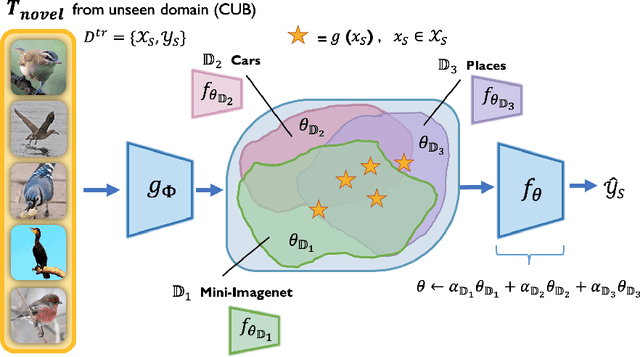Shuman Peng
Improving OOD Generalization of Pre-trained Encoders via Aligned Embedding-Space Ensembles
Nov 20, 2024



Abstract:The quality of self-supervised pre-trained embeddings on out-of-distribution (OOD) data is poor without fine-tuning. A straightforward and simple approach to improving the generalization of pre-trained representation to OOD data is the use of deep ensembles. However, obtaining an effective ensemble in the embedding space with only unlabeled data remains an unsolved problem. We first perform a theoretical analysis that reveals the relationship between individual hyperspherical embedding spaces in an ensemble. We then design a principled method to align these embedding spaces in an unsupervised manner. Experimental results on the MNIST dataset show that our embedding-space ensemble method improves pre-trained embedding quality on in-distribution and OOD data compared to single encoders.
Combining Domain-Specific Meta-Learners in the Parameter Space for Cross-Domain Few-Shot Classification
Oct 31, 2020



Abstract:The goal of few-shot classification is to learn a model that can classify novel classes using only a few training examples. Despite the promising results shown by existing meta-learning algorithms in solving the few-shot classification problem, there still remains an important challenge: how to generalize to unseen domains while meta-learning on multiple seen domains? In this paper, we propose an optimization-based meta-learning method, called Combining Domain-Specific Meta-Learners (CosML), that addresses the cross-domain few-shot classification problem. CosML first trains a set of meta-learners, one for each training domain, to learn prior knowledge (i.e., meta-parameters) specific to each domain. The domain-specific meta-learners are then combined in the \emph{parameter space}, by taking a weighted average of their meta-parameters, which is used as the initialization parameters of a task network that is quickly adapted to novel few-shot classification tasks in an unseen domain. Our experiments show that CosML outperforms a range of state-of-the-art methods and achieves strong cross-domain generalization ability.
 Add to Chrome
Add to Chrome Add to Firefox
Add to Firefox Add to Edge
Add to Edge